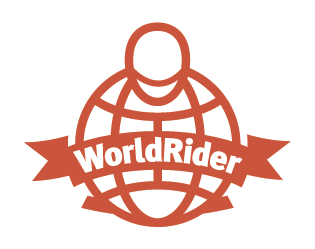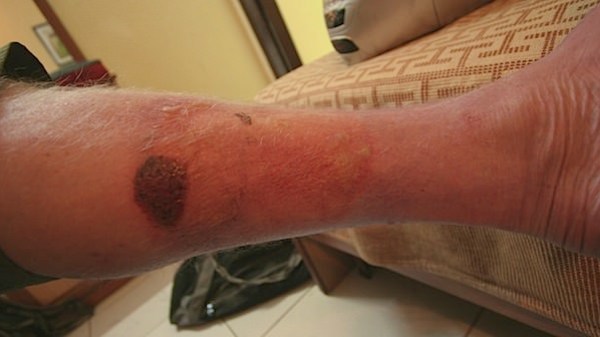Trading Camels, Buying Benzine & Police Checkpoints: The Road To Khartoum, Sudan
At the customs and immigration office in Gallabat, Sudan I learned two things. First, nothing happens quickly in Sudan. Second, the Sudanese are in the running for the most hospitable and friendly people in Africa. The large uniformed man with a scary scar on his forehead took my papers, carnet and passport and asked if I’d like to sit down. Then asked if I would like coffee or tea. I obliged him for some tea.
I was nearly out of gas. Contrary to some traveler information, there was no petrol station in Gallabat. So I asked my stocky customs officer. He said come with me and I sat on the back of a 125cc China-made motorcycle and cruised up the road a bit. At a roadside shack a young boy unlocks a horizontal locker and pulls out a large couple plastic containers. “This gas,’ he says pointing to the red one, “this benzine,” he continued kicking his foot at the yellow one. I was confused. I needed gas. Or I needed benzine. There was a difference in the color coded containers. But was I willing to risk putting something unknown into my bike. I would not have enough to get me to Gederef where I’m sure a proper petrol station would have what I need. I pointed to a car in the street and asked what that used. He pointed to the red can. Then another. This was yellow. Shit. Then I pointed to the Chinese motorcycle and he held up the yellow container. I smelled the contents and figured this would be the right decision and closed the deal.
It took nearly an hour of sitting in the hot sun until the officers felt it was time to return the papers to me. In the immigration office they asked me if I’d like to register, informing me it would be the equivalent of about USD $30. Per the letter of the Sudan law, I knew I had three days to register. I also knew that I didn’t have the equivalent of $30 in Sudanese pounds. The immigration officer asked me to wait. Some discussions went on behind closed doors before he returned with my passport and let me go.
Not sure if the motorcycles came with the tarmac, but the road to Gederef was spanking new and beautiful blacktop, built by the Chinese. I blazed across the desert while watching the heat rise off the payment causing a hazy like blur to the horizon. At the first police check point I had to present my passport and an immigration slip. The question of registration came up again. I simply said “Khartoum.” At the points militants in uniform carrying automatic weapons milled about. But it was all very tame. Nothing and nobody looked threatening. Nor did I pose any threat to them. Later I ran into two nomads with a herd of more than 100 camels. I stopped to chat and shoot a couple pictures, but soon they were asking for my camera. My GPS. My bags. My gloves. Anything I had. They wanted. I sped on.
Hundreds of camels disappeared to the horizon.
The camel trader. He’d rather have anything I’m carrying.
At the gas station in Gederef, I bought a cold soft drink and some salty goods. The parking lot of the place looked like a tractor trailer graveyard. One truck had markings from Texas. Interesting. An elderly man asked if I could help him get to the United States. He said he’d tried three times but was rejected. He suggested that if he changed his religion to Christian he might be more successful. As a Muslim man he felt discriminated — rather profiled. I told him there was nothing I could do and that I doubted that changing religion would have any impact on his application. He admitted he wouldn’t mind. He’d be just as happy as Christian than as Muslim. Funny though, his perception was valid. I couldn’t argue with that, but I also said it was so untrue.
At the next gas stop still 150 miles outside of Khartoum, the attendant was eager to talk and learn about my trip and life in the United States. “I’ve never met an American before,” he said, offering me a cold soft drink. “You came from Gillabat? You must be tired.” In his stripped down “office” was a simple cot. I have to admit that the night before had been the worst night sleep I didn’t have in my whole trip. I took him up on his offer and took an hour long nap, afterwards spending time with the locals from the village who came to gawk at my motorcycle and see “an American.”
You know it’s funny. Since my days traveling in South America it was customary for me to answer the United States to questions of where I was from. But in Africa more often I was given blank stares or “where?” when answering this way. “Oh, you mean America,” they’d say in realization of where I was from. In these parts United and States have no meaning to local villagers. It’s simply America.
The guy was kind enough to let me take a much needed nap. The day was long, windy and hot. With a huge fan and no worries that anyone would touch my bike. I took a chance to get sleep that I didn’t get the night before in Metema.
He wanted to take the bike for a ride, and a friend in the three wheeled taxi, a common site in Sudan, was willing to trade it for my bike.
The entire ride to Khartoum, including stops at customs, immigration and chats roadside and with the gas station folks took the better part of a day. It was long and boring. And hot and dry. I managed to stop for a bowl of rice and soup — ironically enough – to fuel me which in addition to my nap got me into the mad traffic and the confluence of the White and Blue Nile rivers. I went by the Blue Nile Sailing Club which nearly everyone told me was the place to stay and camp. The guard at the gate said it was private. As I gazed over the grounds there was no one and not a bike or overland vehicle to be seen. The language barrier made it difficult to ask the questions I had and there was no one else on the grounds other than the guard. Strange. For a place that has this representation, I can’t believe the guy said “no camping”.
I had a referral to a small guest house outside the center of the city. But it would be impossible to find, so I eventually hired a taxi driver whom I followed to the Bougainvilla Guest House where I men the amazing Norwegian ex-pat owners Birthe and Trygve Overby. Trygve has had a colorful history of working and exploring Africa for most of his life while his lovely wife, Birthe, is an ex-nurse who I recruited immediately to check out the burns on my leg. While I had popped on of the large ugly blisters in Metema, Birthe suggested that I not pop the others. She went to a local pharmacy and picked me a up a bagful of antibiotic cream, bandages, antiseptic cleaning and more. In Khartoum, I cannot imagine a better place to stay and thankfully I was under the watchful eye of trained nurse. Last thing I need is infection to set in while I’m barreling through the Nubian desert.
My leg didn’t look pretty.
Once settled into the guest house I started sorting my stuff and making preparations. After today, I’ve got six days to get to Wadi Halfa.
Sorry for the grotesque photo of my leg. But you can see the spot where I had popped the blister, plus all the big blister and ugly yellow junk. OUch.
This is the bottle that split like the other. Now I figure the other didn’t split when I crashed. Rather the immense heat of the day somehow caused the gas in the can to expand eventually causing the can to burst? Is this possible? The bottle certainly wasn’t filled beyond the fill point. But I think this is rather dangerous as the containers is designed to contain compustible and flammable liquids.
I discovered that the second 1.5L SIGG bottle that I used to carry fuel had also split. This had my mind spinning. The split in the bottle looked exactly like the one I discovered back in Ethiopia. While there was no gas floating in a pool at the bottom of my left Aerostich tank pannier, the guide books I kept stashed her reeked of gas — rather — benzine. I don’t know exactly what happened, but a quick “smell check” revealed that the bottom of my Rallye2 riding pants also smelled of gas. Seems the gas leaked out while I was riding, got on my pants. But could have it gotten through my boot and onto my skin? Or did the heat from that very hot engine riding in the blazingly hot desert cause a reaction where the temperature rose to new heights causing the excessive heat to burn my leg? I’ve ridden through the hottest deserts and for nearly three years and never have seen anything like this. The blister lacked any puss but the floating bubble of putrid yellow skin not only looked scary but to the touch felt very bad. And the pain, safe to say wearing those boots causes a little too much friction and soreness for my liking.










Leave a Reply
Want to join the discussion?Feel free to contribute!